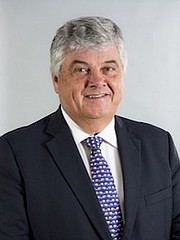By NEIL HARTNELL
Tribune Business Editor
nhartnell@tribunemedia.net
A Bahamian investment bank yesterday revealed that investors injected “the biggest monthly sum that we’ve seen for over a year” into its mutual funds immediately upon the easing of COVID-19 restrictions.
Michael Anderson, RoyalFidelity Merchant Bank & Trust’s president, told Tribune Business that June’s net inflow of “around $6m” suggested the pandemic had “focused attention” on the need to generate income and higher returns among those with surplus assets to invest.
With three new corporate “participants” also attracted to the investment house’s pension schemes this month, Mr Anderson said Royal Fidelity planned to mobilise investor capital to exploit opportunities created by COVID-19’s economic fall-out including the rescue of troubled businesses desperately requiring fresh capital.
“Throughout the period of the COVID crisis, from March through to the end of May, we saw consistent investment - not large amounts, but regular sums - coming into our mutual funds,” he disclosed. “In June, as we got through the worst of it and people realised the economy was ramping back up, people wanted to move money.
“We had the biggest inflow of money into our mutual funds that we’ve seen in over a year. It was probably the biggest month for the last year in June. It was good in the sense that people were sitting there for the previous three months and, after we came through the crisis, they started to invest money and generate money again.
“It [COVID-19] focused attention on certain issues. I think it really represented people who had an opportunity to reflect on their holdings and realise how important it is to get income in a crisis like this. People took action to move money out of bank deposits into our funds. The crisis seems to have focused people’s attention on improving their position for investment and income generation.”
Mr Anderson said the investment activity involving RoyalFidelity’s three-strong investment fund family - the Targeted Equity Fund, Secure Balanced Fund and Prime Income Fund - showed Bahamian investors were prepared to “take advantage of opportunities” to generate greater returns on their assets rather than cash-out, retrench or become more cautious due to the gloomy near-term outlook.
While many fear that COVID-19 will further widen the gap between rich and poor, and spur greater inequalities in Bahamian society as a result of job losses and income cuts, the RoyalFidelity chief said its funds aimed to provide capital market access to small retail investors through minimum subscription or entry points of just $500 to $1,000.
“We were very pleasantly surprised at how few withdrawals we had in that COVID lockdown period across the three funds,” Mr Anderson told Tribune Business. “We had one large withdrawal in March, with the person clearly concerned about the crisis, but we saw consistent inflows straight through.
“June was the really big pick up for us, and I’d like to think it’s the start of more investment through the year. I think, again, people who have funding available will be looking to take advantage of whatever investment opportunities might arise.
“If we can help troubled Bahamian businesses to recapitalise and get their operations back up and running, that will be a nice opportunity to take people’s savings and mobilise them into entities needing investment. That will be part of what we’re looking to do in the second half of the year as we become more aware of those opportunities,” the RoyalFidelity chief continued.
“The economy needs a bit of support, and there’s a lot of liquidity sitting in this market. Even though tourism businesses are struggling, there’s a lot of liquidity overhang sitting in the banks from last year that is not being used to make loans. We need to mobilise that money to help the economy start to pick up.”
The Central Bank’s monthly economic developments report for May, released yesterday, revealed that excess liquid assets in the Bahamian commercial banking system - representing funds that are available for lending purposes - increased by just over $100m during the first five months of 2020 to stand at $2.07bn.
“I’m hoping that what we saw in June was symbolic of what will take place over the rest of the year, and as that money comes into our funds we will start to see investment opportunities arise,” Mr Anderson reiterated.
“We are aware of projects that will be coming to market in the next six months looking for funding, and creating opportunities for investment. It’s more a matter of timing, so as we are able to build and raise funds in our mutual funds, we will be well-positioned to take advantage of possibilities later on in the year as they materialise.”





Comments
Use the comment form below to begin a discussion about this content.
Sign in to comment
OpenID